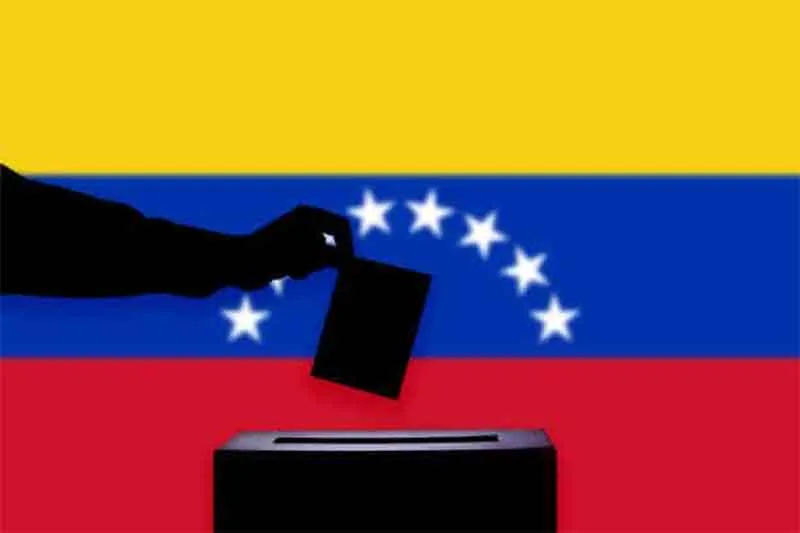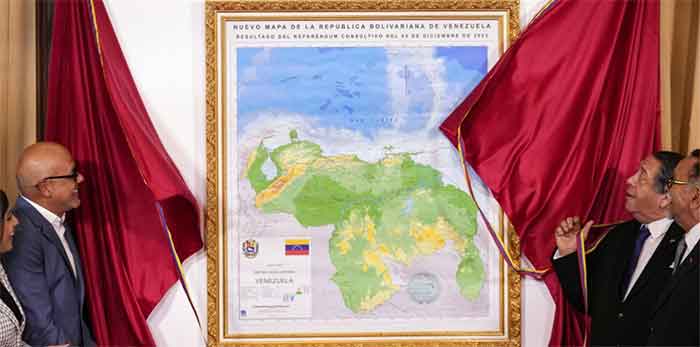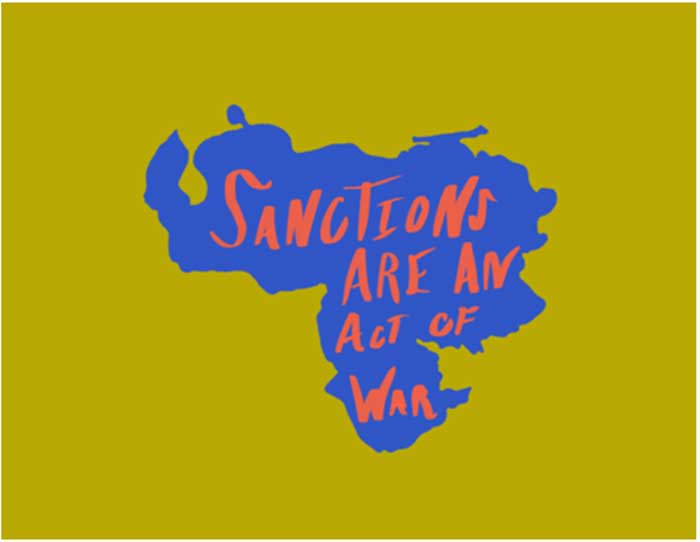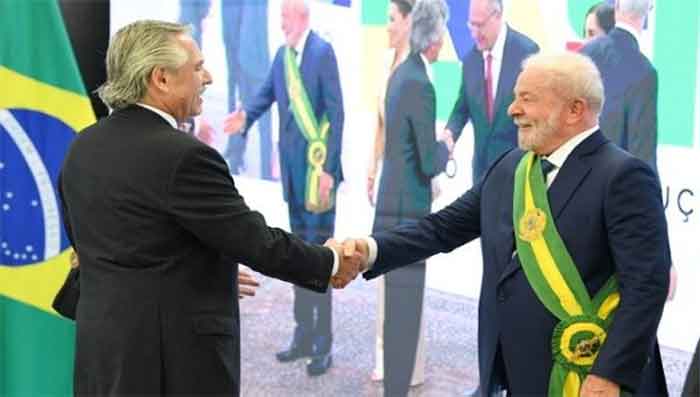
- White House warns Maduro
- S. threatens new sanctions on Venezuela
- Self-proclaimed “president” Guaido sneaked into a concert in Colombia
- US companies and NATO purchase arms in East European country
- Caracas seals Colombia border
- Border tensions, 2 die, provocations
- Russia ready to address UNSC if US stages provocation against Venezuela
- Lavrov to discuss situation in Venezuela with Chinese FM
- Cuba calls for int’l mobilization to prevent war in Venezuela
- Curacao blocks aid ship cargo
- No empty shelves in Venezuelan supermarket
- In the Venezuela case, there is a great media war
- Trade Unions, political organizations oppose imperialism
Imperialists have already enacted acts of bloody provocation at Venezuela-Brazil border with the plan of paving the path for military intervention in Venezuela while imperialism has issued new threats to Venezuela. At the same time, the act of imperialist intervention is facing resistance in and outside of Venezuela while the area of international diplomacy is turning tense.
Media reports said:
White House threatens Maduro
The White House warned Venezuelan President Nicolas Maduro on Friday that any “egregious” human rights violations by troops under his government’s command would not “go unpunished”.
The Trump administration issued the statement following media reports that two persons died and others have been injured following clashes with Venezuela’s military as the U.S. pushes with.
“Egregious violation of human rights by Maduro and those who are following his orders will not go unpunished. […] The Venezuelan military must allow humanitarian aid to peacefully enter the country,” press secretary Sarah Huckabee Sanders said in the statement.
U.S. threatens new sanctions on Venezuela
The U.S. government could announce new sanctions to pressure Venezuelan President Nicolas Maduro as early as next week unless his military defies orders to block convoys of so-called humanitarian aid (humaid) planned for this weekend, a senior administration official said on Friday.
Relentless in its drive to sway the army’s support away from Maduro, the Trump’s administration has threatened to deport the relatives of any Venezuelan officers if they follow their government’s orders, harm the U.S.-backed opposition or prevent the humaid from entering Venezuela.
Washington has never ruled out the possibility of using military force in Venezuela.
U.S. Vice President Mike Pence and other leaders in the Western Hemisphere will meet in Bogota on Monday. Depending on what happens on Venezuela’s borders over the weekend, the leaders could dramatically boost aid pledges to the country – or take new steps to crack down, the official told reporters.
“If there is any type of violence, or if there is any type of negative reaction from the hierarchy of the Venezuela armed forces, there may also be measures that are announced by the vice president and other countries in regards to closing even further the international financial circle,” the official said, speaking on condition of anonymity.
Pence will lead the U.S. delegation to the meeting of the Lima Group, and so far has an “open script” for what he will propose, the official said.
“He has the carrots, but he’s also ready with the sticks for those that promote or execute violence,” the official said.
Bolton cancels S Korea trip
In a sign of the importance of the issue to the White House, U.S. national security adviser John Bolton canceled a weekend trip to South Korea to talk to allies ahead of a summit next week on North Korea’s nuclear talks.
Bolton, known as a notorious hawk, wants to monitor the unfolding developments in Venezuela, his spokesperson Garrett Marquis said.
Guaido sneaked into a concert in Colombia
While the White House is applying maximum pressure on Maduro to force humaid convoys into Venezuela, the U.S.-backed, self-proclaimed “president” Juan Guaido sneaked into a concert in Colombia.
In violation of the travel ban, Guaido arrived in Colombia to attend a fundraising concert bankrolled by the British billionaire Richard Branson.
One video showed the self-appointed “president” was running towards the Colombian border. Another video showed the U.S.-backed politician was running to a Colombian helicopter to be picked up to Colombia. He was greeted by the presidents of Colombia, Chile and Paraguay.
Guaido set February 23 for a showdown with the government of President Maduro over the so-called humaid, which has been stockpiled in Colombia, Brazil and Curacao.
Washington denies using aid as a decoy
US Air Force planes landed in Colombia. The US State Department is struggling to dismiss claims that it was carrying anything else but humaid. Venezuela has said it will block the delivery of U.S. aid, which it believes is a pretext to launch a military incursion.
Venezuelan authorities insist they would accept European aid or deliveries under the auspices of the UN, but would never allow US shipments to cross the border and go directly into the hands of the opposition, bypassing official channels.
The Venezuelan government and its allies claim the US is transporting weapons for the Venezuelan opposition in early March.
U.S. companies and NATO purchase arms in East European country
Russian Foreign Ministry spokesperson Maria Zakharova told a briefing that arms were purchased “in an eastern European country”, and the arms include large-caliber machine guns, grenade launchers, assault rifles and portable anti-aircraft rocket systems
“We have evidence that US companies and their NATO allies are working on the issue of acquiring a large batch of weapons and ammunition in an Eastern European country for their subsequent transfer to Venezuelan opposition forces.”
Maria Zakharova also claimed: The US is planning to transfer weapons and special troops close to Venezuela.
The spokesperson said: The development of events in Venezuela has come to a critical point, everyone understands this. On 23 February, a dangerous large-scale provocation is set to take place, instigated by the Washington-led crossing of the Venezuelan border with a so-called humanitarian convoy, which may lead to clashes between supporters and opponents, forming a convenient pretext for military action to remove the current legitimate president.
Caracas seals Colombia border
To prevent any security threats and illegal crossings, Venezuela announced the temporary closures of border bridges that connect the country to Colombia.
The bridges Simon Bolivar, Santander and Union, will be reopened “as soon as the gross acts of violence against our people and our territory are controlled,” stated Vice President Delcy Rodriguez on her Twitter account.
“In demand of respect for elementary rules of international law, we call on Ivan Duque to cease its infamous actions and stop facilitating the territory of Colombia to attempt, following orders of Donald Trump against the right of the Venezuelans to live in peace and sovereignty,” stated the Venezuelan Vice President.
Thousands of supporters of the Maduro government gathered for a concert held near the Colombian border to demonstrate their resilience and readiness to defend Venezuela’s sovereignty.
Border clashes, 2 die and no-shoot orders
Despite the precautionary measures adopted by the government, Friday saw the first clashes at the border with Brazil. At least two people were allegedly dies and over a dozen others injured in the town of Kumarakapay during skirmishes with security forces.
A group of persons confronted the Venezuelan forces moving to secure border with Brazil. The persons obstructed the Venezuelan forces movement. The act of obstruction and confrontation is considered as an act of provocation.
The Venezuelan government dismissed the opposition’s accusations that soldiers used live fire against civilians.
“What happened has nothing to do with the versions that have circulated,” Venezuela’s foreign minister, Jorge Arreaza, said in New York at UN headquarters, claiming that some of the wounded were injured with “knives, machetes, and even arrows.” Maduro “would never give orders to shoot unarmed people,” the foreign minister insisted, accusing the opposition of following US regime change script and seeking to provoke the armed forces into clashes.
Russia ready to address UNSC if US stages provocation against Venezuela
Moscow is ready to address the UN Security Council in case of an aggression against Venezuela by the United States during humanitarian aid delivery on February 23, Russia’s Envoy to the UN Vasily Nebenzya told TASS on Friday.
“I hope that we will have no reason to do this. But if there is a reason, we will do it,” Nebenzya said.
He added that a group of countries supporting Venezuela at the UN came together not only to support Venezuela’s legitimate authorities, but also to defend international law. “It’s not only about Venezuela. It is also about the approach to resolving international problems and different crises,” he added.
Venezuelan Foreign Minister Jorge Arreaza told TASS that Caracas is coordinating actions with Moscow. “Russia plans to call an emergency session of the Security Council in case of an aggression,” Arreaza said.
The meeting of representatives of over 50 UN member states was held on Friday at the UN headquarters.
Lavrov to discuss situation in Venezuela with Chinese top diplomat on Feb 26
Russian Foreign Minister Sergey Lavrov will make a working visit to the Chinese city of Wuzhen on February 26, Russian Foreign Ministry Spokesperson Maria Zakharova said at a briefing on Friday, adding that the parties would discuss the situation in Venezuela, the North Korea issue and the Syrian crisis.
Cuba calls for int’l mobilization to prevent war in Venezuela
The Communist Party of Cuba (PCC) on Friday called on Latin American political and social forces to slam war threats against Venezuela and support peace in the South American country.
In a statement, the PCC denounced “the escalation of U.S. pressures and actions” aimed at preparing “a military adventure disguised as humanitarian intervention” in Venezuela.
“This situation represents not only a real threat to the Bolivarian Revolution, but also to peace in the continent. Today is Venezuela, and tomorrow it will be Nicaragua, Bolivia or Cuba,” warned the PCC statement.
The document, published by the Cuban Foreign Ministry, said Washington should not underestimate the costs of an aggression against Venezuela as the “possibility of an extension of the armed conflict in the region would affect all the countries in the area and their social, economic and political sectors.”
“We face a typical threat of disguised imperialist aggression, whose main goal is the American appropriation of the largest certified oil reserves of the planet,” said the PCC.
According to the PCC, it is not only an attack against Venezuela, but a final onslaught against the leftist forces on the continent.
The party said defending the Bolivarian Revolution in Venezuela has become “the first trench in the struggle for Latin American sovereignty, social justice, peace with dignity, and unity.”
It called for a united international mobilization to show Washington “that the peoples of the continent do have a sense of its independence and sovereignty.”
Curacao blocks Venezuela aid ship cargo
Curacao island authorities on Friday blocked Venezuelan opposition supporters from loading humaid onto a ship to sail to their country, officials said, with the government citing security.
The Venezuelans have flown containers to Curacao from private donors in the U.S.
The organizers tried on Friday to load the aid onto the Seven Seas supply ship, moored in the port of the Caribbean island 65 kilometers from Venezuela’s coast.
Curacao has become one of the focal points of a volatile standoff between Guaido and Maduro.
The use of Curacao as a sea transit point raised the prospect of a maritime confrontation.
Curacao government communications officer Corinne Leysner told AFP the island’s parliament had agreed to act as a hub for aid “but that goods cannot leave for Venezuela until there is a safe environment to receive them.”
She said the government could not permit the boat to leave with the shipment for security reasons after Maduro’s government ordered the closure of Venezuela’s sea and air borders with Curacao.
“It is a safety issue. Of course we want to help the people of Venezuela but we are not going to be choosing fights,” Leysner said.
The Curacao government said earlier in a statement “the shipments from Curacao will only take place when the authorities in Venezuela agree.”
No empty shelves in Venezuelan supermarket, finds U.S. reporter
U.S. journalist Max Blumenthal went to Venezuela’s capital to see how reports of a humanitarian crisis in the country correspond with reality and found at least one supermarket, which continues to operate well.
Blumenthal visited a hypermarket of the Excelsior Gama chain in Caracas and posted a video showing that there is still a wide selection of meats, cheeses and dairy products, as well as alcohol and basic commodities.
Blumenthal showed that a large package of dog food, which he says, costs 66,000 bolivars and that imported olive oil is worth 85,000 bolivars.
He concluded that he had a “pretty normal” supermarket experience, yet had to pay for it in dollars instead of bolivars, in cash and not with a card.
He noted that the issue is not one of food scarcity or distribution, but rather “buying power” as Venezuela’s currency has been “completely destroyed.”
“It has been completely weakened by hyperinflation, speculation and the flood of dollars that the government cannot control here as well the accumulation by private capitalist elements that support the opposition,” he said.
Blumenthal’s video report came amid reporting from the western media that the country is in a state of humanitarian crisis and people are facing food and water shortages.
The Independent reported last week that “Grocery shelves lie empty as food becomes increasingly scarce and expensive” and a CNN reporter claimed that Venezuelan supermarkets are lacking basic commodities.
In the Venezuelan case, there is a great media war
On Friday, the Venezuelan Foreign Affairs Minister Jorge Arreaza held meetings with over 60 delegations in the UN as well as with Antonio Guterres, UN Secretary General, in order to strengthen international law, peace and the self-determination of the peoples.
“We have met with the group that has emerged to defend the fundamental principles of international law, reflected in the Charter of the United Nations and defend the basic principles for the peace of nations,” said Arreaza during a press conference.
During the press conference, Arreaza requested international media to not lend themselves to US war tactics. As “in the Venezuelan case there is a great media war, not only economic and political.”
He called upon journalists to investigate and get to the bottom of the news. Journalists must be professionals and responsible in arriving at the truth, he said.
He said: The Venezuelan Bolivarian government is looking for dialogue, with the United States and with the right-wing opposition, to find a peaceful solution to the current problems. “We want peace and dialogue, we are sitting at the table and we have not got up. We are here to talk, there is a constitution, let’s look for a peaceful solution.
He stated Venezuela’s economy is giving signs of recovery. He warned that “the U.S. wants to generate violence,” which is why he stated that Venezuelans must be alert and make sure that the violence from Colombia doesn’t spill over into our country.”
According to Arreaza, the Venezuelan “Armed Forces is characterized by its humanism,” and would never act against their own people, but are “ready to protect the national sovereignty,” against attacks.
He reminded the media of how the US military attacked the Dominican Republic in 1965 and imposed a dictatorship, under the same guise of sending ‘humanitarian aid.’
EU’s $2 bln aid
Venezuelan authorities reported on Thursday that the European Union had pledged US $2 billion worth of aid, termed as “technical assistance,” to be channeled through the UN.
According to Maduro, the amount was pledged by the International Contact Group headed by Uruguay and the EU.
Trade Unions, political organizations oppose imperialism
Trade unions and political organizations reaffirmed their opposition to what they term an imperialist coup attempt while stressing the urgent demands of the Venezuelan people and working class.
The meeting was called by the National Struggle Front of the Working Class (FNLCT) and held at Cantaclaro Theater, at the Caracas headquarters of the Communist Party of Venezuela (PCV).
Pedro Eusse, FNLCT national coordinator and member of the PCV politburo, called on workers to unite in a common front against what he termed an imperialist coup. Eusse added that for the first time he US government is openly at the head of regime change efforts.
“They want to put an end to a national liberation experiment and destroy Bolivarianism,” he stressed.
Eusse added that a coming to power of a right-wing government would mean an attack against trade unions, campesinos and social services. He went on to blast US-led sanctions, while explaining that their success also has to do with the weaknesses of the Venezuelan economy.
The communist leader ended by stressing that an anti-imperialist struggle and the struggle for improved workers’ rights and conditions were not separate, highlighting some recent government policies that the FNLCT has been opposing, including mass layoffs, reduced salaries, attacks on collective bargaining and against union representatives.
Representatives from public sector trade unions, including CORPOLEC (electricity), AGROPATRIA (agriculture seeds and supplies) and Barrio Adentro (healthcare) likewise highlighted the need for unity in the present circumstances, but also criticized the deterioration of the public sector companies and of working conditions. The military management of some companies was severely criticized for its poor administration and stifling of trade union activity.
“You cannot build a Revolution with the worn out weapons of capitalism,” said Angel Navas from FETRALEC, the electricity sector trade union, paraphrasing Che Guevara.
Adelmo Becerra, from the National Socialist Education and Training System (INCES) trade union also pointed out that the institution was operating well below its maximum capacity, and that it had suffered from the migration of staff.
Concerning the present scenario, he warned that the government needs to rely more on the working class to overcome what he called an imperialist coup attempt.

















































